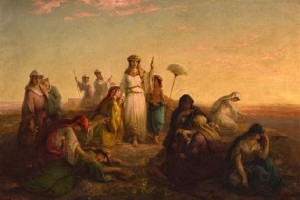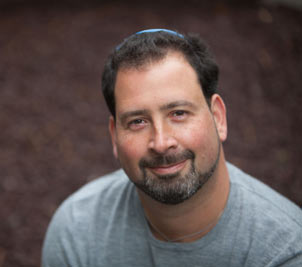About Rabbi Spike
Rabbi Spike Anderson was born and raised in Boston, MA. and was ordained at Hebrew Union College-Jewish Institute of Religion (HUC-JIR) in New York City. Before his decision to enter the rabbinate, Rabbi Anderson worked as an Executive Recruiter in New York and San Francisco. While at Seminary, Rabbi Anderson augmented his studies by serving two summers as an interfaith Chaplain at Dartmouth-Hitchcock Medical Center.
In addition to his rabbinic and pulpit responsibilities, Rabbi Anderson is dedicated to the Israel & Peoplehood pillar of Stephen S. Wise Temple. He works tirelessly to connect congregants with Israel through political action, social action, personal connection, cultural exchange, and study.
As the Rabbi for the Early Childhood Center (ECC) as well as the Kindergarten and Grade 1 students of the Elementary School, Rabbi Anderson has the pleasure of conducting weekly Shabbat services for our youngest members, as well as lively ‘Tot’ and ‘Family’ Shabbats throughout the year. Through song, movement, talking puppet shows and ridiculous costumes, he strives to create a dynamic yet comfortable environment for the children to learn and love their Judaism. With his open door policy and passion for pastoral care, he is honored to provide spiritual guidance to the children as well as their families.
Rabbi Anderson also has taken a leadership role in creating and implementing the ‘Kehillat Wise’ program within our congregational community. Launched in response to the economy crisis, the program is designed to empower congregants to help other congregants; and it has earned nation-wide recognition due to the invaluable variety of resources, programs, and one-on-one guidance.
Wise Hearts is a program that Rabbi Anderson is in the process of revitalizing and taking to the next level. Working with a dedicated committee, Rabbi Anderson oversees as temple members reach out to other temple members in times of joy and sadness, offering gifts, comfort, even help with carpool.
Rabbi Anderson takes the most joy out of being a teacher, and is proud to have students ranging from age 1 to 101 years old. His classroom ranges from congregant’s living rooms to his office at the Temple. This year, Rabbi Anderson will offer such classes as: “Your Personal Theology and Spiritual Journey”, “Finding God”, “Introduction to Judaism”, and “The Hunger Games: what Judaism might have to say about it”.
Chuppah

Jewish Wedding: Chuppah
The ceremony takes place under a Chuppah, or wedding canopy. It represents God’s sheltering presence in the lives of the bride and groom, as well as the new home that they will build together. The presence of family under the Chuppah, as well as its lack of walls, signify that their home will always be open to family and friends.
Filed in: Ceremony
To Haiti: Heartfelt Wishes From Wise

Schools in Haiti were hugely affected after the earthquake
The evening before I boarded the airplane for Israel, my wife handed me a bulging envelope adorned with whimsical design and the words, “To Woodley: These are blessings from our hearts to yours. Please get well soon! From: The children of Stephen S. Wise Temple Elementary School.” Inside the envelope were hundreds of hand-made “get well” cards cut from brightly colored paper in the shape of a hamsa (hand of God); each one with words of hope, healing, and friendship, lovingly crafted by our children.
The messages were numerous and as diverse as the children who wrote them. A yellow card set against sunset orange said:
To Woodley, I am sorry that the people
of Haiti had the earthquake. That must
have been really scary. We sometimes have
earthquakes in Los Angeles, too, but they
are just little ones. Don’t worry. I hope you
feel better soon. Love, Sophie.
Another one, a masculine blue set against pine green, said
Dear Woodley, I am sorry that your heart
is broken. The doctors are really good and
they will fix you up as good as new. I am
drawing a soccer ball because I want you
to get strong again soon so that you can
play. From, Danny.”
A third, this one a jolting pink and green, pleaded:
Hi Woodley, I’m sorry that you are sick.
Does it hurt? Me and all my friends really
want you to get better soon, so that you can
write us back to let us know that you are
okay. Ok? From, your friend, Nima.
The story behind these cards, and how our children came to care for a Haitian boy now recovering from life-saving heart surgery in Israel is an amazing one. But, where do I begin? I suppose we could start with the devastating earthquake in Haiti, and the Israeli “first response” team that arrived with a fully staffed field hospital within hours of the catastrophe. Before the dust had even settled, Israeli rescuers were pulling people from the rubble, while top Israeli doctors and nurses distributed medical aid and performed vital surgeries.
But, that is not really the beginning, as some of these very same doctors were pediatric heart surgeons from Wolfson Hospital in Holon, Israel; and, they were passionately dedicated to an organization called Save A Child’s Heart (SACH) (www.saveachildsheart.org). SACH’s mission is to bring children from developing countries in need of life-saving heart operations to Israel, where the doctors and nurses perform the surgery pro-bono. While in Haiti, as part of that “first response” team, the Israeli doctors identified some of these kids who desperately needed cardiac surgery. One was a six-year-old boy named Woodley. And so, when the doctors returned to Israel, they brought little Woodley with them.
But, that is not really the beginning either. We have to ask ourselves, why is it that a group of Israeli pediatric heart surgeons would dedicate their lives to children, the vast majority of whom are not Israeli, and who are not even Jewish? The hundreds of kids who come through SACH to Israel for surgeries every year range from places as different from Israel as Angola and Uganda, Gaza and Iraq, Romania and China. The children they bring to Israel are Christian, Muslim, Buddhist, and Hindu with skin color that spans from Eastern European white to deep African black, and everything in between. Why do they do this? At the core, it is because they believe that saving children should transcend politics and all differences. They are driven by two of the highest biblical imperatives which demand that we, as Jews, are supposed to save lives (Pikuah Nefesh), and we, as Jews, are supposed to act as a beacon of light unto the world (Ohr LaGoyim). These Israeli doctors do both.
And, their efforts inspired us at Stephen S. Wise Temple, an ocean away, to try to help. From the moment the earthquake first devastated Haiti through months later when I was able to deliver the “get well” cards to Woodley himself, recovering in the Israeli hospital, Stephen S. Wise Temple and Schools sprung into action to help repair our world. From the bimah, we spoke of their plight, donated thousands of shoes, and dedicated a Shabbat Service in their honor. From the classrooms, our children sent their prayers and donated money to assist SACH’s efforts. And, from our souls, our hearts went out to theirs.
Filed in: Articles
The Royal Secret (creative Midrash)

Whispers had followed Thermutis through the royal palace long before she was aware that she could shield herself with them, or even wield them as a sword.
Whispers had followed Thermutis through the royal palace long before she was aware that she could shield herself with them, or even wield them as a sword. Even before her moon-blood, not once but twice she had snatched the dulled murmur of plotting between servants and guards; and twice, after executing the traitors, her father had publicly proclaimed that she was surely a girl suitable only for a god. Those were the whispers of caution, the whispers of danger, the whispers that flirted with death.
If she had not been the Pharaoh’s daughter, nobody would have said that she was beautiful. Her nose was a bit too long, her skin was a bit too dark, and once she filled out, her curves were too pronounced for her ever to assume the sleek cat-like grace that came with being divine. Yet, she was the pharaoh’s daughter and so nobody would ever actually say anything of the sort… at least not where it could be heard; yet she heard, through the stones and corridors she heard, those whispers, cruel in their nakedness, veiled with smiles, and teeth.
Not that she did not have suitors; she did, of all kinds…. But she loathed the insincerity of her brothers and half-brothers, step-brothers and ambitious cousins as much as their crass innuendos, like crocodiles below the surface, panting like a dog in heat. The other princesses, her sisters and half-sisters, seemed to enjoy the attention, masterfully controlling it like a Hittite charioteer. But Thermutis wanted nothing to do with it. She had no desire for harness or reigns. And so she retreated deeply into the cool chambers of her maidservants. The walls of silk and music, seductively sweet, deflecting those new whispers of secrets behind closed doors.
When Thermutis did emerge, it was rare and usually only at the beckoning of her father; after all, even as a favored daughter, even she could not ignore the summons of the living god, the son of Ra. When he did call her, it was often to the shaded garden on the west side of the palace grounds. There, amid the sound of hummingbirds and the meandering stream that the engineers had averted from the Nile, they would sit together. Her father was a stern man, busy with running an empire, building the new capital at Thebes, and surrounded by enemies; yet as the sun set he would relax and they would simply talk as father and daughter.
“Thermutis,” he would say to her, “you cool my heart. You are my favorite daughter and surely I owe you my life. Who would you like to marry? I will get for you any man that you desire from my kingdom, of high birth or even low. You must know that any of your brothers, or half-brothers, step-brothers or cousins would marry you in a blink of an eye. Which one do you fancy? It would please me very much to give such a wonderful gift to you.”
“Oh father,” Thermutis would reply with lowered eyes, “you are the best father any daughter could ask for. You have always been so good to me. But I do not like any of the men that I have seen in the entire kingdom.”
“Well then,” the Pharaoh magnanimously decreed, “surely I can extend my reach to any man in any kingdom anywhere. What foreign prince would not seek to have his name set in stone, and to join the ranks of the immortal? What King would not give his right hand to cement an alliance with Egypt, a road that would lead to riches and protect against all enemies?
“Oh father,” Thermutis would demur, “Everyone knows that you are the living god, son of Ra the great Sun-god. Can you blame me for not wanting to settle for a man, but rather, will marry only an immortal?”
“Yes daughter,” Pharaoh replied, suddenly uncomfortable, “it is true that we have divine blood pumping through our veins, and we are not anchored to this world as simple mortals, but you see,…well, its complicated…but the bottom line is, you have to marry.”
“But why?” asked Thermutis, slowly lifting up her eyes, and meeting those of the Living Law, whose decrees created reality with a power over life and death, the ability to sack nations and move mountains.
“Because,” answered her father with sad eyes, “you must have a child…ideally a boy. If you don’t, the rumors that follow you like vultures will never cease. A child, one that you can call ‘son’ will automatically turn the harsh, desert wind into a cool summer breeze. It matters not who the father is, but the child is essential. For even I, surrounded by my magicians and scribes, sycophants and bodyguards, hear what they say about you. I have ignored it because I love you, but an insult to you is an insult to me. If we do not drive these vultures off, heads will roll. So…, my favorite child, my ‘unique’ one, at this time next year if one of the gods have not chosen to take you as a mate, I will choose you a husband. So please, for the sake of your happiness, and the lives of many, pay attention to your suitors.
Thermutis was crushed, and her countenance fell like a dark shadow. The music of her chamber, formally lovely and cool, was now stifled with sobs and bitter tears. Her handmaids, desperately loyal to their princess, tried to cheer her up with tales of marriage and honor…but Thermutis only grew more taciturn as she considered the curse that all women were forced to bear, even one such as she who was suited only for a god.
The days grew long and the summer grew unbearably hot. From the palace-eunuchs Thermutis heard whispers of unrest from Goshen, the area where the Hebrew slave-people dwelled in their mud huts amid strange chanting. At night, straining to catch a breeze from her balcony, Thermutis and her maidservants would listen to the distant drums, sometimes yearning to escape, sometimes violent as marching, echoing over the desert sands from their slave quarters.
“A possible 5th column,” the shifty guard told her.
“A people with ancient ties to powerful magic,” screeched Balaam, her father’s volatile sorcerer.
“They will side with our enemies and rise up against us,” conferred the fearful merchants.
“It is because of them,” said the nameless street, choking on its own dust, “that there is sickness and bad luck, backbiting and unrest. It is because of those Hebrew slaves that prices rise and I don’t have a job, that the Nile floods and the sand-storms rage. Because of them I can not sleep at night, and the wolves howl, and my leg aches. About the slave-people of Goshen, who are strangers amongst our people, something about those Hebrews needs to be done!”
“And so it shall,” said Thermutis’ loving father, eager to weather the ferocious summer heat, his backed up sewers, and the abundant poverty and evil that flourished in his own land. We shall sacrifice the land of Goshen to all of our gods, starting with every male child, until our gods are drunk with Hebrew blood, for only then, when the Nile runs red, might their appetite be sated.” …So bellowed the word from the Living Law.
As the hot nights continued, Thermutis and her handmaidens would stretch out on her balcony with their whole bodies, drooped like flaccid sails, hoping for a breeze. But through the dark night the echoes of the Hebrew drums, now beaten with a desperate anger, carried high pitched shrieks of wailing.
The summer dragged on, and even the oldest of the wizened women could not remember a more uncomfortable, stickier season. Everyone’s clothing would be drenched with sweat and humidity seconds after dressing, the air was flat and still, and the flies were merciless. Anxious to find relief, Thermutis went with her favorite handmaidens to a secluded spot along the banks of the Nile. Eagerly, the young women shucked their clothing, and dove into the cool, muddy waters.
Just then, from the middle of the river they heard the wails of an infant, carried across the flowing water by the mid-day breeze. Straining her eyes, Thermutis saw a basket of reeds, like a cradle, drifting lazily, as if being nudged by the river god, Nuit. “Ah,” thought Thermutis, with a certain bitterness in her heart, “if only I could receive a child as pleasantly, and as effortlessly, as this. If only it were as easy as diving into the cool water and plucking the baby out of that basket. …No boring suitors, no fake ceremonious pomp, no false oaths, and no sweaty man on top of me demanding that I submit to him as chattel. If only…”
And then, for a few seconds, time stood still. The basket, now so close that she could smell the bitumen and waterproofing pitch, seemed to freeze atop a Nile wave. The river-water glistening under the love of the afternoon sun. The rich, musk smell of the muddy reeds settled like a cloud. “If only…what if she took the Hebrew baby and somehow hid it for a few months. She would say that she was visited at night by the god, Nuit, who told her that since she had divine blood, she alone was suited for him. Her father would never deny that it was possible…and he did say that what was important was the child, not the child’s father. She could pretend to be sick in the morning like pregnant women do, and stuff her shirt with cloth. It could be a difficult pregnancy, so that she could ask her father to demand that no one, NO ONE, enter her chambers except her handmaidens. She would have to get a wet-nurse, one who would never betray her secret… She and the baby would stay in the chambers for several months, and then emerge! People might talk, and some might not believe her, but none would publicly dare contradict the validity of Pharaoh’s grandson. What if…” And Thermutis, after ordering a handmaiden to fetch the baby from the basket, drew her arms around her confidants, and she began to whisper.
Filed in: Articles
Bedeken (Veiling of the Bride)
 Legend has it that this tradition, which means “checking,” dates back to Biblical times, when Jacob was tricked by his father-in-law Laban. Jacob was presented with an already-veiled bride; he discovered only after the ceremony that she was not his intended bride, Rachel, but instead her sister, Leah. Often we will include Veiling of the Bride either immediately following the Ketubah signing, or as part of the processional to the Chuppah. By checking under the veil, the groom indicates that he is sanctifying the bride to be his wife.
Legend has it that this tradition, which means “checking,” dates back to Biblical times, when Jacob was tricked by his father-in-law Laban. Jacob was presented with an already-veiled bride; he discovered only after the ceremony that she was not his intended bride, Rachel, but instead her sister, Leah. Often we will include Veiling of the Bride either immediately following the Ketubah signing, or as part of the processional to the Chuppah. By checking under the veil, the groom indicates that he is sanctifying the bride to be his wife.
Filed in: Ceremony



